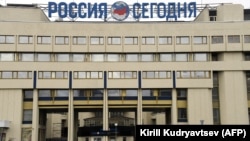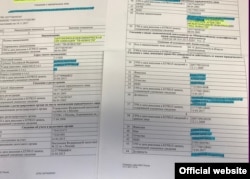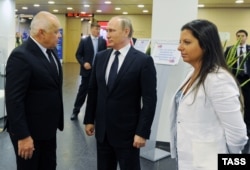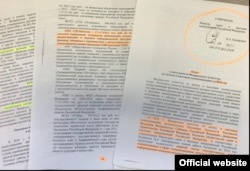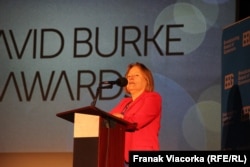RT-America, the U.S. branch of the Russian international broadcasting conglomerate, registered as a foreign agent under FARA on November 10, fulfilling the demand from U.S. Department of Justice.
RT operates in the U.S. behind a so-called “shell company,” registered in Washington, DC on April 2, 2014, as “T&R Production.” The registration form says T&R Production is a limited liability company “wholly owned” by its sole member and general manager Mikhail V. Solodovnikov, with a $670,000 annual salary.
Under the “foreign principal” section in FARA T&R Production chose, out of three options -- government of foreign country; foreign political party; foreign or domestic organization -- the third option, naming ANO TV-Novosti as its foreign principal and describing it as an “NGO registered under Russian Federation law.”
The company’s profile in Russia’s Federal Taxation Service database says ANO TV-Novosti registered in April 2005 as an Autonomous Nonprofit Organization, with the same address in Moscow as listed on RT’s FARA form: 111020 Borovaya St. 3.
Two people are named as fully authorized to act on behalf of ANO TV-Novosti. One is a man unknown to the public named Alexey Lvovich Nikolov – the CEO and a deputy chief editor. His name was added to the registration on April 14, 2017. The second name is familiar to many: RT’s chief editor Margarita Simonovna Simonyan, who, according to the document, is chief editor of RT’s “foreign principal” ANO TV-Novosti as well.
According to Russia’s Federal Taxation Service, ANO TV-Novosti’s registrant and founder is the Federal state unitary enterprise/Russian international information agency “RIA Novosti” – a media corporation listed in the database of Russia’s Federal Agency for State Property Management as “property of the Government of the Russian Federation.”
RIA Novosti itself was registered by two government agencies – the Federal Agency for Press and Mass Communications and the Federal Agency for State Property Management – each of which also owns 50 percent of the company. Under the leadership of the well-known TV host Dmitry Kiselyov, RIA Novosti is in a process of transformation into a new media conglomerate, “MIA Rossia Segodnya,” which includes Russia’s other international broadcaster, Sputnik.
According to the open database of Russian federal government contracts, from the time it was registered in April 2005, ANO TV-Novosti had at least eight government contracts, totaling 216,439,922 rubles (approximately $7.79 million according to April 2005 exchange rates). These included a contract with the Federal state budgetary educational institution of higher learning “The Diplomatic Academy of the Ministry of Foreign Affairs of the Russian Federation.”
The nature of the contracts was described as the “provision of informational services covering the activities of government entities.”
Russian news agencies are expected to reflect a positive image of the Russian government. In April 2017, the Russian Federal Agency for Press and Mass Communications presented its 2016 annual report to President Vladimir Putin.
The report says that the Russian Federal Agency for Press and Mass Communications “exercised the functions of a state client in financing, controlling and supervising the subordinate entities” in accordance with the president’s address to the Russian Federation Council, in which Putin underlined “main directions of the information policy.”
These “directions” included “propagating and promoting the formulation of Russia’s positive image globally.”
On page 12, the report provides details from the budget of the Federal Agency for Press and Mass Communications dedicated to government-owned media in 2016.
It reads: “ANO TV-Novosti” – 17,517,636.300 rubles”(around $293,577). With additional mention of an unspecified increase of its “federal budget” in 2017 due to a creation of a French language channel under Russian Federation government decree #1385 of December 12, 2016.
Media reports indicate a more significant direct financial funding of RT from the Russian Government over the course of 12 years since RT's establishment in 2005.
In 2005, ANO "TV-Novosti" invested $30 million in start-up costs to establish RT, with a budget of $30 million for its first year of operation.
In December 2008, the Russian Government included ANO "TV-Novosti" on the list of core organizations of strategic importance.
RT's annual budget increased from approximately $80 million in 2007 to $380 million in 2011, but was reduced to $300 million in 2012.
In October 2012, when the Russian Finance Ministry attempted to reduce funding for Russia Today once again, President Vladimir Putin responded with an executive order forbidding the budget reduction.
In 2014 RT received 11.87 billion rubles ($310 million) in government funding and 15.38 billion rubles ($400 million) in 2015.
RT's government funded budget for 2016 was 19 billion rubles ($307 million).
The U.S. Department of Justice had given RT until Monday, November 14 to register as a foreign agent or face legal action. RT opposed the requirement and the Committee to Protect Journalists called it “a bad idea…a shift in how the law has been applied in recent decades.
The Russian Duma, the lower house of the Russian parliament, Tuesday, November 15 unanimously approved legislation allowing the government to force foreign media organizations operating in Russia to register as “foreign agents.”
The Russian Justice Ministry followed up with letters to nine media outlets, warning they might be forced to register. Voice of America and Radio Free Europe, as well as the program Current Time and Polygraph’s partner fact check Factograph also were warned.
“The Voice of America is an independent news source required by law to be accurate, objective and comprehensive,” said VOA Director Amanda Bennett. We remain committed to our mission to provide independent and reliable programming to our global audiences.”
VOA is a government owned and run news organization. The journalists work behind a “firewall,” established following a 1994 federal broadcasting act and a charter established in 1976 law.
“The 1994 law prevents government policymakers from interfering in coverage. And the legislation authorized the Broadcasting Board of Governors ensure that VOA journalists comply with the highest standards of broadcast journalism, including accurate and objective news reporting,” said Bennett.




